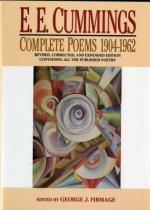|
This section contains 3,728 words (approx. 13 pages at 300 words per page) |

|
For Cummings, self-discovery was supremely important and the only valid motive for writing a poem; it separated his awareness from stereotyped awarenesses, separated his identity as an artist from his conventional identity as a member of society. If the truth of human existence is to be uncovered and recognized, it will be accomplished through the perspective of the artist. (pp. 12-13)
In the process of writing a poem, the poet discovers his identity, which paradoxically is one of fusion and harmony with the eternal forces of change. The artist discovers his identity in the eternal by resisting the current of temporal affairs; at the same time, it is in the temporal world that the artist discovers the eternal and spiritual. This unfolding of identity is never-ending: it depends upon an honest appraisal of felt experience. (p. 13)
The happiness of Cummings' early life, his sense of being loved, and...
|
This section contains 3,728 words (approx. 13 pages at 300 words per page) |

|


